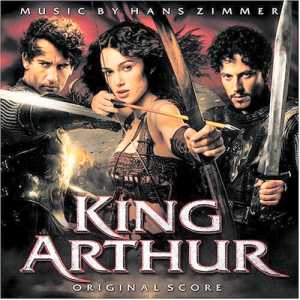King Arthur
Music composed by Hans Zimmer
Additional music composed by Nick Glennie-Smith & Rupert Gregson-Williams
Conducted by Nick Glennie-Smith
Choir conducted by Rupert Gregson-Williams
Choir – Metro Voices
Featured Vocalist Moya Brennan
Includes the song "Tell Me Now (What You See)" performed by Moya Brennan, written by Zimmer/Brennan
Available on Hollywood Records 2061-62461-2
Running time: 57.50
Amazon UK Amazon US

See also:
Tears of the Sun
Gladiator The Last SamuraiFollowing Hans Zimmer's scores for Gladiator (2000) and The Last Samurai (2003) his music for King Arthur is exactly as expected; modern would-be epic scoring by numbers; big, bold, bombastic and thoroughly professional. One might call it writing to formula, but then so might one so describe what Miklós Rózsa did for any number of these film's 1950's MGM antecedents. And while it is easy to decry the revisionism of the current release – which owes far more to director Antoine Fugua's previous Tears of the Sun (2003) (also scored by Zimmer) - than it does to any "historical" or legendary King Arthur, we do well to remember an earlier generation's epics such as King Arthur and The Knights of the Round Table (MGM – Rozsa – 1953) were equally ersatz. Essentially Zimmer does for King Arthur in a modern accessibly modern musical language what Rozsa did for King Arthur… half a century ago – put the large-scale sweeping emotionalism into a cardboard adventure. At least 1953 audiences didn't have to put up with Keira Knightly vying with Halle Berry for the summer's most laughably dressed action heroine.
Some have suggested Zimmer is being lazy here – I don't think so. He is delivering the sledgehammer sound he has been hired to provide, for a formula film which falls clearly within the precisely defined parameters of the new wave of historical would-be epics (I use the phase "would-be" because by definition an epic is a work on the largest scale possible, which means 70mm photography, a three hour plus running time, and musically an overture and intermission… - the current crop of films are epic-lite, often shot in video-friendly Super35 and so more akin to a 16mm blow-up than the epic grandeur of 70mm, with running times which scarcely break 2˝ hours, allowing for four multiplex showings a day. King Arthur runs a mere 130 minutes). Zimmer gives King Arthur just what it needs, and what dramatic power and emotional impact the film has stems largely from his – and fellow composers Glennie-Smith & Rupert Gregson-Williams' work. The bizarrely titled "Budget Meeting" is perhaps the most thrilling set-piece on a disc of six lengthily cues and a song, but there is a considerable amount of exciting scoring to enjoy.
The themes may not be particularly memorable, but this is still rousing stuff. Zimmer's aforementioned scores are the template here, but he has added compelling choral writing in the Western Church tradition – actually largely the work of Alistair King – to the mix to strong effect. Against that we have the usual wordless "ethereal" female vocals, which have to now be the second most irritating cliché in contemporary film scoring. The first being inappropriate cod-'Orish scoring (see, Braveheart, Titanic, The Lord Of The Rings, ad nauseum). Unhappily Zimmer manages to combine the two, employing Moya Brennan of Clannad fame for both a mediocre commercial title song and wordless vocals accompanying introspective score passages –this Arthur is supposed to be an English hero, yet still Hollywood must foist fake Irish mist upon us.
At least though, while one very high profile composer insists on reworking Prokofiev's music for the battle on the ice from Alexander Nevsky at every possible opportunity (most recently in another of this summer's epic-lite entries), King Arthur actually reworks that famous scene itself and Zimmer provides his own, rather than Prokofiev's melodic material for the set-piece "Hold The Ice".
Very much "Gladiator 2", King Arthur is a satisfying enough release, though the threads are becoming bare (and not least Keira Knightly's). Yes, the pulse is raised by the action music, emotions stirred by the more evocative moments – wordless cod-Irish clichés aside – but its not a trick which can be repeated too many times. As perhaps the lacklustre performance of the film itself indicates.
Now perhaps a film maker with a real feeling for the material can give us the great epic Arthurian film to surpass even John Boorman's magnificent Excalibur. Though after the current picture doubtless another decade will have to go by before Hollywood greenlights a new Arthur film.
Gary Dalkin
31/2
Return to Index